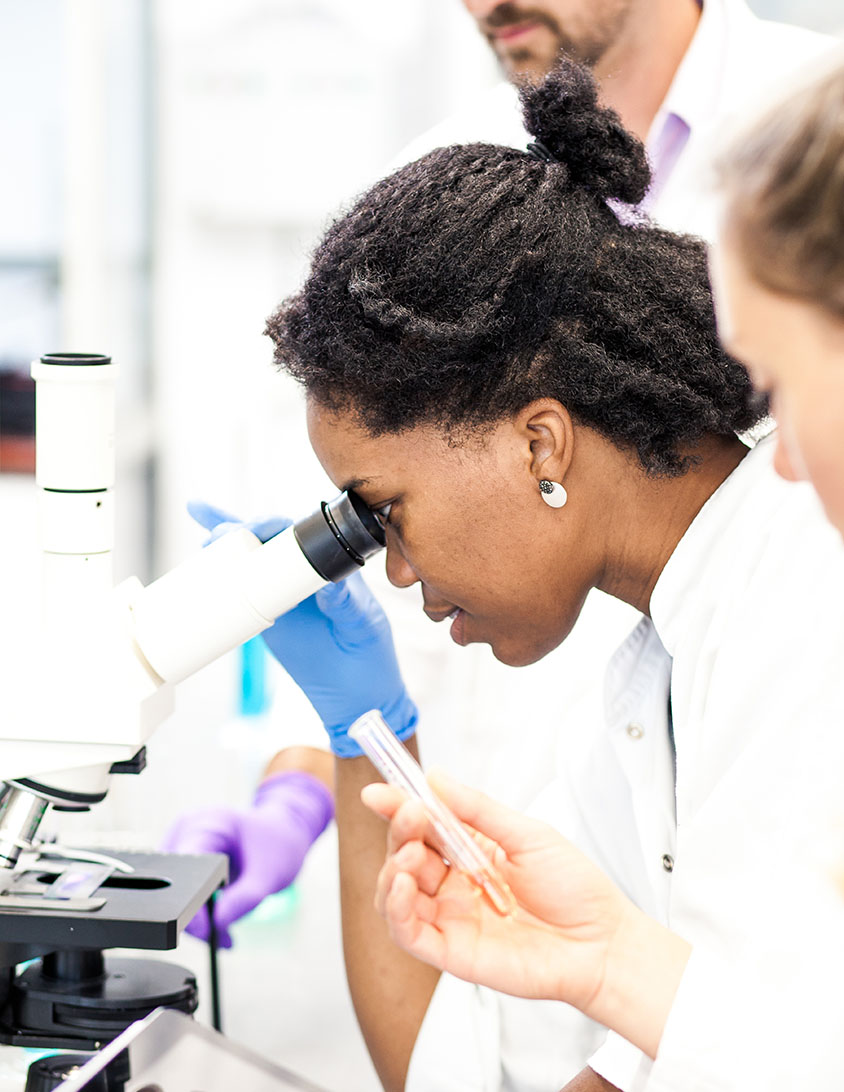
Innovations in Science
Background and Review Criteria
Background. MDA has invested over $125M in the development of gene therapy for neuromuscular diseases (NMDs) over the past 20 years. To continue to lead the way in this important field of medicine, MDA held a summit in January 2022 to address the challenges in safely delivering AAV-based gene replacement therapy to NMD patients. In this meeting, top experts and stakeholders convened to talk openly about adverse events linked to clinical trials in the field. Although experts collectively agree that gene therapy holds great promise in addressing the underlying cause of many neuromuscular diseases, there are still many challenges and risks that must be overcome to fully realize the translational potential of gene therapy in NMDs affecting children and adults.
Gene therapy and DMD. Duchenne muscular dystrophy (DMD) is an X-linked muscle wasting disorder with relatively rapid progression and is the most prevalent form of muscular dystrophy. The genetic basis underlying DMD pathology is loss of function mutations that disrupt the dystrophin gene, causing absent or severely reduced dystrophin protein in skeletal and cardiac muscles, causing susceptibility to contractile-induced injury. Thus, gene replacement strategies for DMD represent an attractive and viable therapeutic prospect in targeting the root cause of the disease with the aim of restoring dystrophin protein function.
Adverse events reported. In accordance, several companies have devised gene therapies in the form of truncated dystrophin replacements (micro- or mini-dystrophin) packaged in adeno-associated virus (AAV) for systemic delivery into skeletal and cardiac muscle. Despite strong evidence for efficacy and safety in preclinical animal models, all clinical trial sponsors of dystrophin gene replacement therapies reported concerning adverse events link to AAV-delivered dystrophin-based therapies. These adverse events range in severity from moderate effects such as vomiting and nausea, to serious effects such as thrombotic microangiopathy (TMA), myositis, myocarditis, renal impairment, and also death.
Triggers for adverse events. Discussions surrounding the post-treatment timing and clinical features of these events reveal two different causes linked to the safety of AAV-delivered dystrophin therapies: capsid-triggered and transgene-triggered responses. Capsid-triggered safety concerns typically occur shortly after treatment and is linked to immune responses directed at AAV particles. These safety events are presumed to be commonly associated with systemic delivery of AAV therapies and is not specific to DMD patients or therapies. However, transgene-triggered safety concerns typically occur several weeks after treatment and is linked to immune responses directed at the dystrophin transgene. It is hypothesized that transgene-triggered responses occur as a result of immunoreactive epitopes in the dystrophin transgene that can cause a reaction in certain patients with ‘at risk’ genotypes.
Consequences of transgene-triggered adverse events. This newly reported phenomenon is a specific immune response triggered in a subpopulation of DMD patients and is believed to be linked to their mutation type and locus. The serious nature of transgene-triggered safety concerns has led to the exclusion of DMD patients with pathogenic mutations in the N-terminal region of dystrophin from participating in future gene therapy trials. It remains to be established whether more patients will be excluded in the future due to the identification of additional immunoreactive epitopes in the dystrophin transgene. As many more DMD patients will undergo dystrophin replacement therapy in the coming years, the nature of transgene-triggered safety events needs further investigation.
Request for Applications (RFA): MDA will fund a two-year project grant to enhance understanding and formulate mitigation strategies for transgene-triggered adverse events in relation to dystrophin gene replacement therapy. Examples of research that might be supported by this RFA include, but are not limited to, the following:
- Identification of ‘at risk’ patient genotypes for transgene-triggered responses as it relates to DMD mutation types
- Further investigation into the nature of immunoreactive epitopes in the dystrophin gene
- Re-design of dystrophin transgene therapies to minimize transgene-triggered responses
- Development of immunosuppression strategies to minimize transgene-triggered responses
- In vitro assays and/or models predictive of transgene-triggered immune responses
Principal investigators from academic institutions are encouraged to apply.
Key Dates:
RFA Open: June 10, 2022
Letter of Intent Due: July 11, 2022
Invitations for full applications: July 18, 2022
Application due: August 29, 2022
Start Date: November 1, 2022
Funding:
- The successful applicant will be receive the Christopher Duncan Horn Memorial award for a total of $200,000 ($100,000 per year over a two-year period) to conduct the proposed study.
Application Instructions:
- To view the application instructions, log in to MDA’s online grants management system, proposalCENTRAL.
Review Criteria:
- Impact: What is the potential for the proposed study to make significant progress towards understanding and minimizing transgene-triggered safety concerns in the context of DMD gene replacement therapy?
- Research Team and Environment: Are the PI(s) and collaborators well suited to the project with the requisite expertise to perform the proposed work? Will the scientific environment contribute to the likelihood of success?
- Innovation: Does the application propose a novel and unique approach to investigate transgene-triggered immune responses with the potential to impact clinical translation?
- Research Strategy: Is the overall strategy well-reasoned and appropriate, including a strong rationale for the study, rigorous methodology and experimental design, and high feasibility of the approach?
- MDA Medical Education
- Grants at a Glance
- Research Grants
- Creating a New Therapy
- What We've Achieved
- MDA Venture Philanthropy
- MDA Annual Conference
- MOVR Data Hub
- Newborn Screening for Neuromuscular Diseases
- Cost of Illness of Neuromuscular Diseases in the US
- Contact Our Research Team
- MDA Kickstart Program
- Telemedicine Resources
Find MDA
in your Community
-

Grants at a Glance
Read More -

Search for Clinical Trials
Learn More